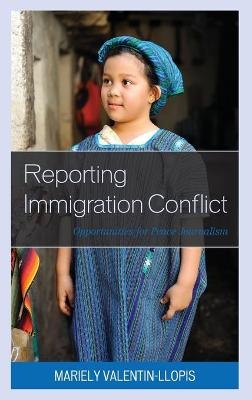
Reporting Immigration Conflict
Opportunities for Peace Journalism
Seiten
2021
Lexington Books (Verlag)
978-1-7936-1349-3 (ISBN)
Lexington Books (Verlag)
978-1-7936-1349-3 (ISBN)
This book examines the role of American and Mexican media in promoting, unintentionally or otherwise, harsh views against Central American migrants. The author challenges journalism’s traditional approach to news production by introducing the peace journalism rubric to immigration reporting.
In Reporting Immigration Conflict: Opportunities for Peace Journalism, Mariely Valentin-Llopis examines the role of American and Mexican media in promoting harsh views against Central American migrants. This examination focuses on the U.S. southwestern border crossing conflict in 2014 and 2019, both separate consequential periods in time. Valentin-Llopis contextualizes migrants’ plight with careful consideration to unaccompanied minor migrants and the family separation crisis. As a counterpoint, the author also takes the news content analysis through a historical journey to when news reporters seemingly bent traditional journalism principles to protect Cuban children refugees fleeing the Castro regime and communism, showing that it is possible to provide fair depictions of migrants and their struggles. Valentin-Llopis challenges journalism’s traditional approach to news production by introducing the peace journalism rubric to immigration reporting. Scholars of international relations, journalism, history, and minority studies will find this book particularly useful, while media practitioners in the field can also find practical approaches to transforming their work for the benefit of peace solutions to pressing transnational conflicts.
In Reporting Immigration Conflict: Opportunities for Peace Journalism, Mariely Valentin-Llopis examines the role of American and Mexican media in promoting harsh views against Central American migrants. This examination focuses on the U.S. southwestern border crossing conflict in 2014 and 2019, both separate consequential periods in time. Valentin-Llopis contextualizes migrants’ plight with careful consideration to unaccompanied minor migrants and the family separation crisis. As a counterpoint, the author also takes the news content analysis through a historical journey to when news reporters seemingly bent traditional journalism principles to protect Cuban children refugees fleeing the Castro regime and communism, showing that it is possible to provide fair depictions of migrants and their struggles. Valentin-Llopis challenges journalism’s traditional approach to news production by introducing the peace journalism rubric to immigration reporting. Scholars of international relations, journalism, history, and minority studies will find this book particularly useful, while media practitioners in the field can also find practical approaches to transforming their work for the benefit of peace solutions to pressing transnational conflicts.
Mariely Valentin-Llopis is assistant professor of communication at Barry University.
Preface
Acknowledgments
Chapter 1: Latino Immigration, Cognitive Biases, and Media Effect
Chapter 2: The Ethics of Care and Peace Journalism
Chapter 3: The Press and the Case of the Cuban Unaccompanied Minors
Chapter 4: Two Regions Reporting on the Border Conflict: 2014
Chapter 5: What Changed?: Two New Presidents, One Conflict in Common
Chapter 6: Conclusion: Challenges and Opportunities
References
About the Author
| Erscheinungsdatum | 28.07.2021 |
|---|---|
| Verlagsort | Lanham, MD |
| Sprache | englisch |
| Maße | 162 x 228 mm |
| Gewicht | 431 g |
| Themenwelt | Sozialwissenschaften ► Kommunikation / Medien ► Journalistik |
| Sozialwissenschaften ► Politik / Verwaltung ► Staat / Verwaltung | |
| ISBN-10 | 1-7936-1349-4 / 1793613494 |
| ISBN-13 | 978-1-7936-1349-3 / 9781793613493 |
| Zustand | Neuware |
| Haben Sie eine Frage zum Produkt? |
Mehr entdecken
aus dem Bereich
aus dem Bereich


